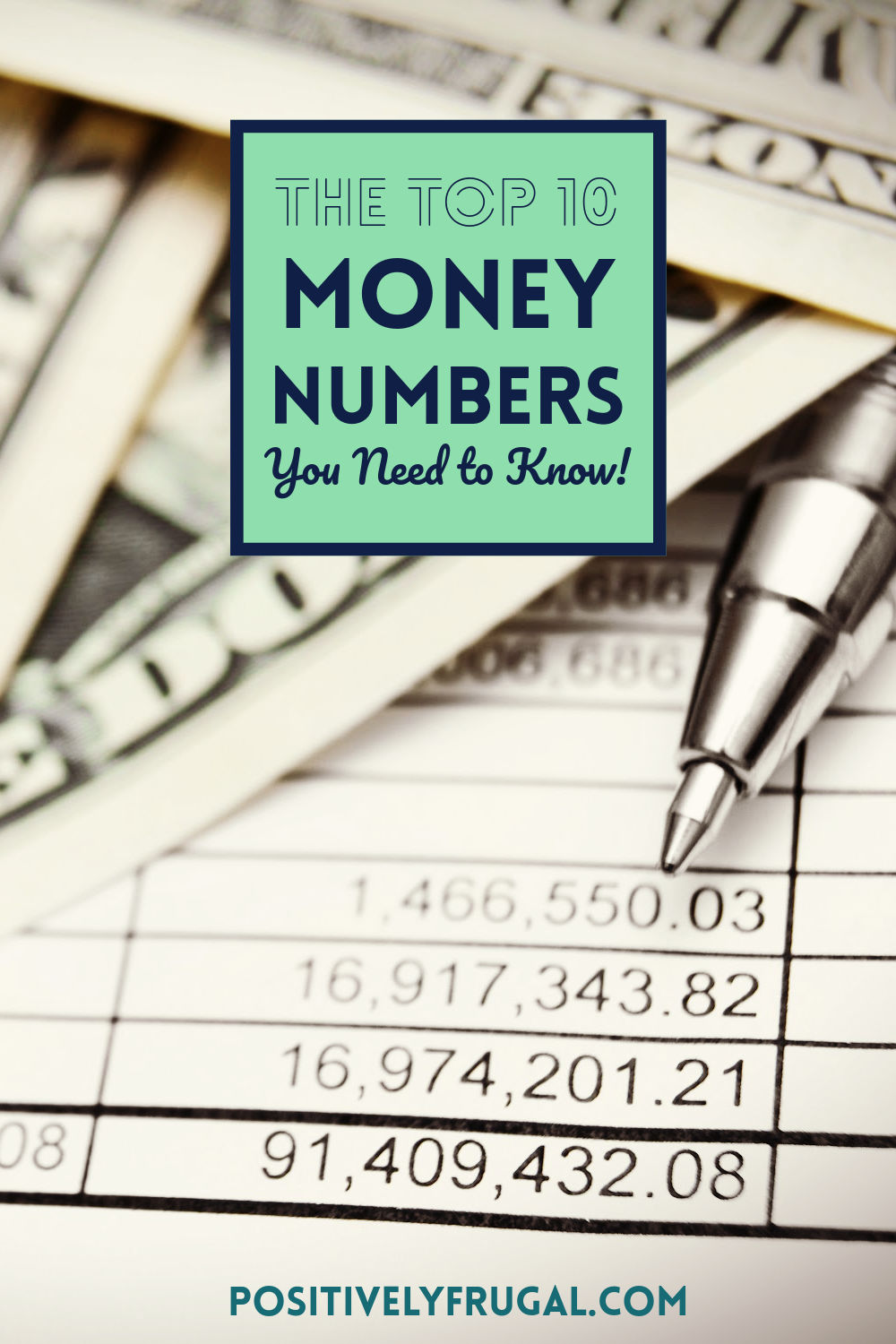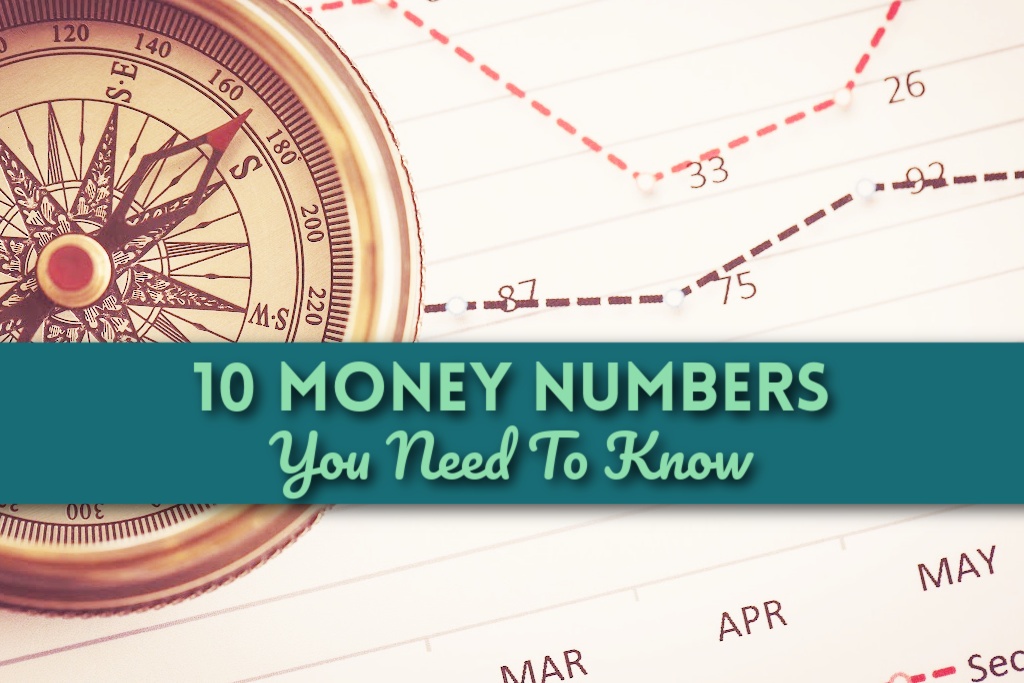Some of the links on this site are Affiliate Links and if you use them to make a purchase, we may earn a commission. For more information, read our Disclosure Policy.
Money numbers are the need-to-know figures and stats that are related to your finances. Knowing your money numbers will help you gauge your financial health.
What are Money Numbers?
Money numbers are all of the monetary numbers that make up your financial life. While money is numbers – and it is important to know how much money you have – there is so much more to your complete financial make up.
The personal finance numbers that you need to know include actual values, rates and scores.
Why Are Money Numbers Important?
You are where you are, and you go from there. The sound advice often spoken by my father-in-law is relevant for any situation when choosing a route in life. It’s applicable to your financial path, too. Before you can take your first step, however, you need to know where you are – and that is why you need to know your money numbers.
By understanding and knowing your money numbers, you can evaluate where you currently are financially – and then determine where you want to be in the future. With your money numbers, you can more easily achieve financial success.

10 MONEY NUMBERS TO KNOW
Money and numbers go hand in hand. I’m highlighting the need-to-know money numbers so that you can set your course for a successful financial life.
#1 Your Income
The first money number you need to know if your income. While you likely already know your salary or hourly wage, the real need-to-know money number is your Take Home Pay.
Your Take Home Pay – or net income – is the amount you are paid after deductions are taken from your paycheck. It is the amount that is actually spendable.
The reason why this is the most important money number to know is because it is the number on which you base all of your expenditures and savings. You need to know the actual dollar amount of incoming money – or else you risk overspending and going into debt (which, clearly will not lead to financial success!).
Your Take Home Pay is the first number you need to create a monthly budget – and it is oh-so-important to have a budget! Once you enter your net income into your budget, then you can calculate how much to spend and on what.
How To Calculate Your Net Income
Finding your net income is straightforward – just look at your paycheck stub. (If you are self-employed, use your latest tax return.)
Your gross wage is the amount your employer agrees to pay you – and that should appear first. Deductions – like taxes (federal, state, local, social security and Medicare), benefits (insurance) and contributions (401k, retirement fund) will be subtracted from your gross pay. The amount left after your deductions is your Take Home Pay.
If you want, you can take it a step further and calculate your net hourly wage. In order to find out your hourly take home wage, simply divide your net income by the number of hours you worked in that pay period.
#2 Expenses for Necessities
Your monthly cost for necessities is another one of the key monetary numbers that you need to know.
The items to include are the bare bones costs required for your most basic living expenses. To calculate your basic needs expenses, add up what you pay monthly for your mortgage (or rent), utility bills, transportation costs (car payment, gas, insurance), food, childcare and credit card and loan repayments.
Why Basic Needs are a Key Money Number
There are a couple of reasons why tracking your basic need expenses are such an important finance number.
First, it reveals how much of your net income you are dedicating to your necessities. Many financial experts recommend spending 50% of your Take Home Pay on basic living expenses – leaving some money leftover for Wants (30%) and Savings (20%).
If your calculations show that you are exceeding the 50% mark, you might want to reevaluate your basic needs spending and make adjustments. Consider making a move to less expensive housing or taking on a roommate to share the costs. Learn how to be more frugal with your food or negotiate your bills (one of my top frugal hacks!).
The second reason why your necessary expenses are such a crucial money number to know is that it is how you calculate your Emergency Fund.
Everyone should have an Emergency Fund…everyone needs one, in my opinion. Initially, saving $1000 for emergency situations is a good start. However, a truly well-financed Emergency Fund will be able to cover your basic expenses for 3-6 months. Saving so much in your Emergency Fund will prove useful in unfortunate events, such as job loss, illness or major car or home repairs.
#3 Expendable Income
Your expendable income – or disposable income – is one of the fun money numbers you need to know!
For the purposes of this blog post, when we talk about your expendable income, I am referring to the amount of money that you have after deductions have been taken from your paycheck and your necessities are paid.
If you have already figured out your money numbers for items #1 and #2 on this list, then calculating expendable income is easy. It is simply the amount of your paycheck that is left after subtracting the first two items (Your Net Income minus Basic Expenses equals Expendable Income).
Why Expendable Income is a Good Money Number to Know
Disposable income is the money that you get to spend – or, better yet, save.
There are endless reasons why this is a good dollar figure to keep top of mind. It is a guide for your spending – one that will help keep you from overspending. Likewise, a firm understanding of your disposable income will help you to best determine a strategy for saving and investing.
Furthermore, any bonuses or pay raises that come your way can be more easily figured into your accounting.

#4 Retirement Contributions, Savings and Social Security
Whether retirement is far off in the future or just around the corner, it is important to know your money savings for retirement.
Questions you will first need to ask yourself are: When do I want to retire? and How much do I need to retire?
When it comes to retirement funds, there are three money numbers you need to know: Employer 401k and 403b plans and their incentivized match, personal retirement savings IRAs and your estimated social security payout.
Employer Plans and the Company Match
If your company offers a pre-tax retirement savings plan, it can be advantageous to participate in it. The money is deducted pre-tax and you can decide how much you want to put into that account (up to a certain limit).
Furthermore, if the company offers a matching program – where they contribute money into your account – then that means they are giving you free money and it would be silly not to take it! It is ideal to max out your match (at the very least). Your HR representative can help if you are unsure what amount you need to contribute to take full advantage of the match.
Personal IRA Accounts
The second money saving number to know is your own personal retirement fund, if you have one set up. Understand the risk level of how you have invested your funds and make adjustments as necessary.
Also, make sure to keep track of your accounts with any past employers; it’s probably best to roll all previous employer 401ks into one fund.
Social Security
Social security benefits – as in paychecks – become available between the ages of 62 and 70. The catch is, the earlier you start taking the checks, the less money you get in each check. Therefore, you need to run the numbers on different scenarios to best make your decision.
To track your money numbers for social security – your estimate of benefits and retirement age scenarios – create a free (and very useful!) My Social Security Account.
You can read more about the basics of investing for retirement in The Simple Path the Wealth – one of my top recommended Beginner Finance Books.
#5 Amount of Debt
Debt is a hinderance to your financial success, which is why I continually sing the praises of being debt free. That said, if you are in the situation where you are carrying debt – be it credit card debt, student loans, car loans or even a mortgage – it is essential to know your debt money numbers.
You need to know your amount of debt, interest rates and monthly payments. It is best to track these numbers somewhere – like in your budget binder or bullet journal and set up a system to pay off your debts more quickly.
To fully understand your debt numbers – and how much your debt is costing you – use a helpful debt repayment calculator. It’s absolutely mind-blowing (and will likely motivate you to get rid of debt once and for all!).

#6 Debt-to-Income Ratio
Your debt-to-income ratio is another one of the financial numbers you should know. Not only is it a figure that helps you to better handle your finances, but it is also a number used by lenders to determine whether or not they will loan you money – and at what interest rates.
Debt-to-Income ratio is calculated by taking the sum total of your monthly debt payments and dividing it by your monthly gross income. The number shows you how much of your income is being used to repay debts.
For example, if you make $3,500 in income per month and have a $1000 monthly mortgage payment, a $100 student loan payment and $200 in credit card payments (for a total of $1,300 debt), you divide $1,300 by $3,500. Your debt-to-income ratio is 37%.
The lower your debt-to-income ratio the better. Generally speaking, a 20% debt-to-income ratio (or less) is considered low, while a rate of 40% or higher indicates financial stress.
#7 Credit Score and Credit Reports
Credit scores have long been touted as one of the must-know money numbers. Your credit score is an indicator of your credit risk (the likelihood that you will repay the money you borrow and that you will pay it back on time).
Lenders and creditors look at your credit score before loaning you money (for a house, car or other major purchases) or issuing a credit card. Other times your credit score (or just your credit report) might be checked is when you apply to live in an apartment or are searching for a new job.
In general, a score of 670 or better is considered good.
How To Get Your Credit Score
You can obtain your credit score a few different ways. It may be on your credit card statement (mine is) – but you might also find it on a loan statement. If you can’t find it there, you could use a credit score service or non-profit counselor to get your credit score for free (but I would be very leery of either of these options!).
Of course, you can buy your FICO credit score direct from one of the three credit bureau reporting agencies for about $20.
Credit Report
Your credit report is available to you for free (one time per year). Contact one of the three credit bureaus – Experian, Equifax and TransUnion – to get your report.
Review your report to make sure that the information is accurate and that no fraudulent activity or identity theft is associated with your credit history.
#8 Bank Account Balances
Knowing your bank account balances is a no-brainer in terms of money numbers. You should always know how much money you have in your bank accounts.
Some people may only have one bank account – and that keeps things simple as far as knowing how much money you have in it. However, if you opt to have several bank accounts with more than one banking institution, then you need to have a system to keep track of your funds.
Bank Fee Money Numbers
Additionally, there are a few more bank account money numbers that you need to be aware of – like monthly fees, minimum requirements, overdraft/insufficient fund fees, money transfer costs and ATM service fees.
Ideally, you will give your bank as little money as possible in order to keep more money in your account.
Find out how monthly checking fees can be waived, be sure not to dip below minimum account balances required, link up accounts (if possible) to avoid overdraft charges and clearly understand out-of-network ATM fees (because those can add up in a hurry!).
#9 Lifetime Earnings
Possibly more intriguing than necessary when it comes to numbers and money, your Lifetime Earnings can be an incredibly fascinating (or extremely disappointing) money number.
Lifetime earnings are exactly what they sound like: the amount of money you have earned in your entire life. You can easily find your lifetime income on your social security statement on the My Social Security Account.
Why You Should Know Your Lifetime Earning Money Number
Beyond curiosity, there are a few of reasons why lifetime earnings are one of the money numbers that you want to know.
If you are already late in your career and have worked a number of years, your lifetime earnings are an indicator of your possible social security benefits.
For those in the midst of their earning years, looking at your lifetime earnings can be a bit of a wake-up call. See how much you have earned…and then see how much you have saved.
On the other hand, if you are early in your working years, then you might want to calculate your possible lifetime earnings. Use this calculator to explore your lifetime earning potential.
#10 Your Net Worth
Your net worth is a powerful money number. It measures the dollar amount of your assets, minus all of your debts…in other words, what you own, less what you owe.
The number shows you where you are – which is the first step in knowing where you are going. Calculating your net worth will let you know where you currently stand and how can you improve your financials.
To calculate your net worth, simply add up the value of everything you own – home equity, retirement investments, cars, boats, collectibles and bank account balances. Next, add up what you owe – include your mortgage, credit cards, student loans, car loans and even medical bills. Subtract what you owe from what you own and that is your net worth.
There is no magic number to hit in terms of your net worth. Knowing this money number is simply an eye-opener to your finances. It helps you to balance your income with your expenses, reminds you to limit the amount of debt you take on and encourages you to save more.
Tips on Tracking Money Numbers
Now that you know all of the money numbers you need to know, I have a few final tips for tracking them.
How Often to Check Your Money Numbers?
Important financial numbers – like your bank account balance – is a number you should know and check regularly (at the very least on pay days!).
All of the other finance figures could be reviewed every six months to a year – or as needed.
For example, if you are about to buy a home, checking your credit score and calculating your debt-to-income ratio is a good idea. If you get a raise, recalculate your net income and if you pay off a big debt, do the math to figure out your net income.
While money numbers are good to know, I would caution against getting too obsessed with them. Spend more time and effort setting financial goals and developing your relationship with money.
Where to Track of Your Finance Numbers?
In order to keep your money figures top of mind without fixating on them, I recommend recording and reviewing your numbers frequently. This way, you can quickly peek at them as a reminder – and see your progress over time.
Keeping track of your numbers in your budget binder is a good place – as is a financial bullet journal. Another popular way to keep a close eye on your money numbers is with a Budget Tracking App!
I Want To Know: Do you know your money numbers? Do you track any other money-related numbers and where do you track them? Give us your tips on the comments!
Interested in more of my Life and Entertainment Tips? I round them all up on the Frugal Lifestyle page!








